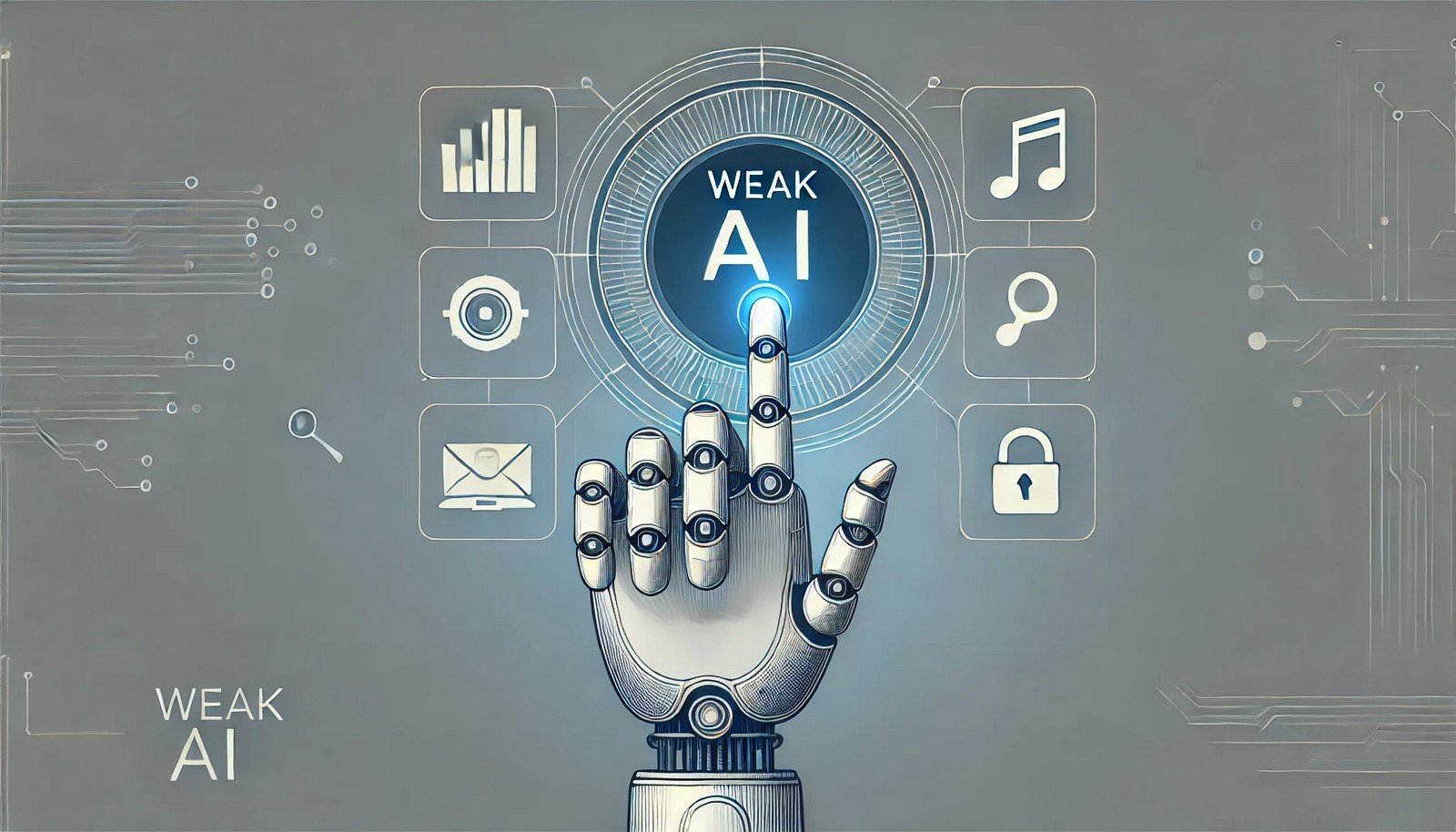Weak AI or Narrow AI

Quick Navigation:
- Weak AI Definition
- Weak AI Explained Easy
- Weak AI Origin
- Weak AI Etymology
- Weak AI Usage Trends
- Weak AI Usage
- Weak AI Examples in Context
- Weak AI FAQ
- Weak AI Related Words
Weak AI Definition
Weak AI, also known as narrow AI, refers to artificial intelligence systems designed to perform a narrow or specific task rather than exhibit general intelligence. These systems are highly specialized and operate within a limited context, such as facial recognition, language translation, or recommendation engines. Weak AI can process information, perform calculations, and make decisions within its defined scope but lacks true consciousness or understanding. Unlike strong AI, which theoretically could exhibit human-like cognitive abilities, weak AI is not self-aware and does not seek to learn outside its programmed functions.
Weak AI Explained Easy
Imagine a robot that only knows how to play a single game, like chess. It can play that game really well because it's programmed to understand the rules and strategies, but it can't do anything else. Weak AI is like that—it’s super good at one thing but doesn’t know or understand other things. It’s like a really smart tool for one job, but it can’t think for itself or do other tasks.
Weak AI Origin
The concept of weak AI emerged alongside early advancements in computer science and AI research in the mid-20th century. Researchers initially envisioned machines that could perform specific tasks to aid human activities, such as solving complex calculations or playing chess. The term “weak AI” was introduced to distinguish it from “strong AI,” which would theoretically be capable of independent reasoning and thought, similar to human intelligence. Weak AI's development has been guided by practical applications rather than theoretical exploration, focusing on efficiency and accuracy in task-specific environments.
Weak AI Etymology
The term "weak" in weak AI doesn’t imply that the AI is ineffective; rather, it indicates that the AI is designed for narrow, specific tasks. The contrast with “strong” AI highlights weak AI's limited scope and purpose.
Weak AI Usage Trends
Weak AI has become increasingly popular with the growth of machine learning and data science, particularly since the early 2010s. Applications like virtual assistants, image recognition software, and recommendation algorithms demonstrate weak AI’s prevalence in everyday life. The focus on weak AI reflects a practical approach to AI deployment in industries such as healthcare, finance, and entertainment, where automation of specific tasks can yield substantial benefits. Companies continue to invest in weak AI due to its reliability, cost-effectiveness, and lower risk profile compared to ambitions in general AI.
Weak AI Usage
- Formal/Technical Tagging: Task-specific AI, narrow AI, artificial intelligence, machine learning, specialized algorithms
- Typical Collocations: "Weak AI application," "task-focused AI," "specific-function AI," "practical AI use," "AI-driven automation"
Weak AI Examples in Context
A voice-activated virtual assistant like Siri or Alexa is an example of weak AI because it can perform specific tasks, such as setting reminders or playing music, but it doesn’t understand or reason beyond its programming.
Facial recognition software used in smartphones for unlocking devices is a classic case of weak AI, as it’s limited to identifying faces and doesn’t extend its function to other recognition or reasoning tasks.
Self-driving car software represents weak AI, as it is engineered to interpret road signs, detect obstacles, and make decisions based on predefined algorithms, not through genuine understanding.
Weak AI FAQ
- What is weak AI?
Weak AI is a form of artificial intelligence that is designed to perform specific, narrow tasks without general intelligence or understanding. - Can weak AI learn new tasks?
No, weak AI can only perform the tasks it’s programmed for and cannot adapt to new or different tasks on its own. - Is weak AI conscious?
No, weak AI does not have consciousness or self-awareness; it simply follows programmed instructions. - What are examples of weak AI?
Examples include virtual assistants, recommendation engines, and facial recognition software. - How does weak AI differ from strong AI?
Weak AI is task-specific, while strong AI would theoretically have general intelligence similar to human cognition. - Is weak AI safe?
Generally, weak AI is considered safe because it operates within limited parameters and lacks autonomy. - Can weak AI make decisions?
Yes, weak AI can make programmed decisions, but only within the scope of its task. - Where is weak AI commonly used?
Weak AI is used in many fields, including healthcare, finance, retail, and entertainment for task automation. - Will weak AI evolve into strong AI?
Not directly; while advancements are possible, weak AI systems are inherently limited in scope and not designed for evolution into strong AI. - Does weak AI use machine learning?
Yes, many weak AI applications incorporate machine learning to improve performance within their specific task.
Weak AI Related Words
- Categories/Topics: Artificial intelligence, machine learning, task automation, digital assistants, data analysis
- Word Families: narrow AI, specific-function AI, domain-limited AI
Did you know?
In 2011, IBM's weak AI system, Watson, famously competed on the quiz show Jeopardy! and defeated two champion players. This achievement demonstrated weak AI’s potential to analyze vast data and make complex decisions within a specific context, sparking public interest in AI applications for industries beyond entertainment.
PicDictionary.com is an online dictionary in pictures. If you have questions or suggestions, please reach out to us on WhatsApp or Twitter.Authors | Arjun Vishnu | @ArjunAndVishnu

I am Vishnu. I like AI, Linux, Single Board Computers, and Cloud Computing. I create the web & video content, and I also write for popular websites.
My younger brother, Arjun handles image & video editing. Together, we run a YouTube Channel that's focused on reviewing gadgets and explaining technology.



Comments powered by CComment